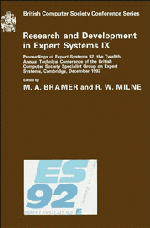Book contents
- Frontmatter
- Contents
- Preface
- Introduction
- CONSULTANT: providing advice for the machine learning toolbox
- A methods model for the integration of KBS and conventional information technology
- KBS methodology as a framework for co-operative working
- Project management for the evolutionary development of expert systems
- The specification and development of rule-based expert systems
- Towards a method for multi-agent system design
- Jigsaw: configuring knowledge acquisition tools
- On the relationship between repertory grid and term subsumption knowledge structures: theory practice tools
- Strategy maze: an on-line tool for support management of the knowledge acquisition process
- Concurrent engineering using collaborating truth maintenance systems
- Ockham's razor as a gardening tool
- A designer's consultant
- Fairness of attribute selection in probabilistic induction
- An application of case-based expert system technology to dynamic job-shop scheduling
- Neural network design via LP
- KEshell2: an intelligent learning data base system
- Approaches to self-explanation and system visibility in the context of application tasks
- An object oriented approach to distributed problem solving
- Intelligent user interface for multiple application systems
- Combining qualitative and quantitative information for temporal reasoning
- Documents as expert systems
Introduction
Published online by Cambridge University Press: 04 August 2010
- Frontmatter
- Contents
- Preface
- Introduction
- CONSULTANT: providing advice for the machine learning toolbox
- A methods model for the integration of KBS and conventional information technology
- KBS methodology as a framework for co-operative working
- Project management for the evolutionary development of expert systems
- The specification and development of rule-based expert systems
- Towards a method for multi-agent system design
- Jigsaw: configuring knowledge acquisition tools
- On the relationship between repertory grid and term subsumption knowledge structures: theory practice tools
- Strategy maze: an on-line tool for support management of the knowledge acquisition process
- Concurrent engineering using collaborating truth maintenance systems
- Ockham's razor as a gardening tool
- A designer's consultant
- Fairness of attribute selection in probabilistic induction
- An application of case-based expert system technology to dynamic job-shop scheduling
- Neural network design via LP
- KEshell2: an intelligent learning data base system
- Approaches to self-explanation and system visibility in the context of application tasks
- An object oriented approach to distributed problem solving
- Intelligent user interface for multiple application systems
- Combining qualitative and quantitative information for temporal reasoning
- Documents as expert systems
Summary
In 1980, when the British Computer Society's Specialist Group on Expert Systems was established, it was remarked that the number of operational expert systems in the world could be counted on the fingers of one mutilated hand.
Expert Systems and its parent field Artificial Intelligence, which were then barely known outside a few specialist academic institutions, are now accepted parts of most degree courses in Computer Science.
Moreover, the history of expert systems in the last ten years is a highly successful example of technology transfer from the research laboratory to industry.
Today there are thousands, possibly tens of thousands of expert systems in use world-wide. They cover a very wide range of application areas, from archaeology, through munitions disposal to welfare benefits advice (see, for example, Bramer 1987, 1988, 1990).
Many of these systems are small-scale, developed in a few months (or even weeks) and often comprising just a few hundred rules. However, even relatively straightforward expert systems can still frequently be of great practical and commercial value.
The Department of Trade and Industry recently produced a series of 12 case studies of commercially successful expert system applications in the UK which included systems for tasks as diverse as product design at Lucas Engineering, corporate meetings planning at Rolls-Royce and personnel selection at Marks and Spencer (DTI, 1990). However, despite explosive growth in the last ten years, it seems clear that we are still only scratching the surface of possible applications.
- Type
- Chapter
- Information
- Research and Development in Expert Systems IX , pp. 1 - 4Publisher: Cambridge University PressPrint publication year: 1993



